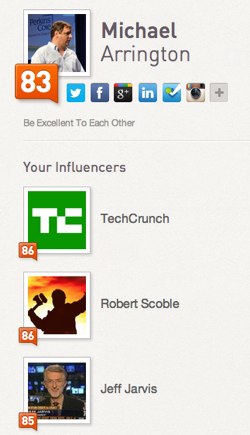Klout has been one of my go to punchlines for some time now. For example – in May I wrote a post titled “My Detailed Thoughts On Klout” that contained a single word in the post itself: “Why?”
The problem I had with Klout was that it was just another meaningless social game to play. People were wrecking their heads trying to game it and get their score up higher.
To keep his [Klout] score up, Lee tweets up to 45 times a day—an average of one every 32 minutes. “People like food porn,” he notes, “so I try to post a lot of pictures of things I eat.” Lee once took a vacation during which he had no access to the Internet. This made him uncomfortable. “I was worried that brands couldn’t get in touch with me. It’s easy for them to forget about you. And I knew my Klout score would go down if I stopped tweeting for too long.”
That’s just pathetic. And then having companies focus their marketing attention on these people. Lee got an Audi A8 for a few days. More:
Matt Thomson, Klout’s VP of platform, says that a number of major companies—airlines, big-box retailers, hospitality brands—are discussing how best to use Klout scores. Soon, he predicts, people with formidable Klout will board planes earlier, get free access to VIP airport lounges, stay in better hotel rooms, and receive deep discounts from retail stores and flash-sale outlets. “We say to brands that these are the people they should pay attention to most,” Thomson says. “How they want to do it is up to them.”
So my “Why?” post was just that – this wasn’t something I had a big problem with, it just seemed kind of stupid.
 Not long after that Chi-Hua Chien from Kleiner Perkins contacted me and convinced me to give the company another look. Yes, the current product was a bit cheesy he admitted. But that was all going to change in the very near future, he said. MG Siegler and I soon sat down with CEO Joe Fernandez at the companies offices in San Francisco, saw the product vision and met some of the people who work at the company.
Not long after that Chi-Hua Chien from Kleiner Perkins contacted me and convinced me to give the company another look. Yes, the current product was a bit cheesy he admitted. But that was all going to change in the very near future, he said. MG Siegler and I soon sat down with CEO Joe Fernandez at the companies offices in San Francisco, saw the product vision and met some of the people who work at the company.
And Chi-Hua was right. I’ve changed my mind. So much so that CrunchFund has now invested in Klout, and we’re big believers in what they’re doing.
They’ve relaunched the product and a lot of the tricks that people used to game the system are gone. And better, Justin Bieber is no longer considered the most influential person in the world on Klout.
Klout will have a constant, ongoing battle in fighting gaming. But that’s ok. Google is in a constant fight defending the integrity of PageRank, too. And yet we find it interesting. Klout is very much like a PageRank for people and things. And it can be much more useful than just helping companies hand out perks.
First, there’s a lot of data being collected and processed by Klout. A staggering amount of data about people and things from a wide variety of social services. No one else is doing this. The end Klout scores are just the tip of the iceberg, so to speak, on what this company can eventually do with all that data.
Second, Klout’s head is in the right place. Here’s a snippet from an email exchange I had with Fernandez not long after my “Why?” post:
In the end, my goal is to build a product that goes beyond the gimmicks and drives real value for everyone. I believe that every person who creates content online has influence to some group of people and on some topic. Everyone also wants to feel listened to and interesting and I think we can do this in a way that empowers people to become better, more effective, online citizens.
That’s what I really like about the company’s goals. It isn’t to get people like Lee to spend all day tweeting to try to drive his score up. It’s to showcase what’s interesting about people, and help them “feel listened to.”
Klout’s goals are sort of the opposite of what I first presumed. They’re encouraging constructive online behavior, and they’re gathering and processing tons and tons of data along the way.
That’s why I like Klout so much. And why CrunchFund recently invested.